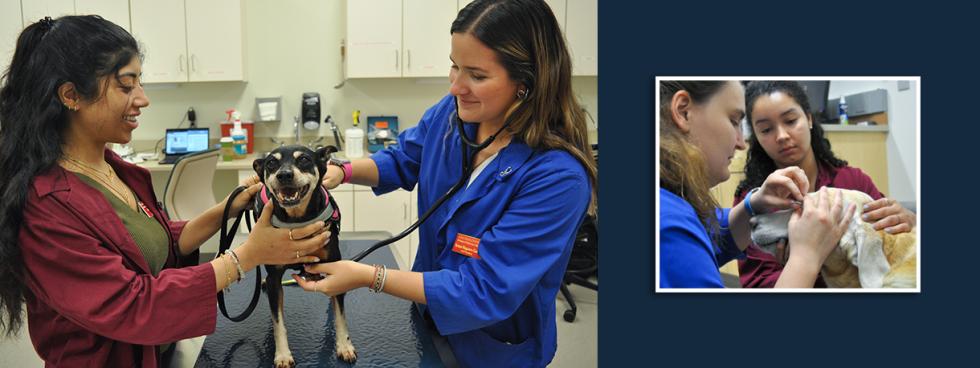
Gaining Valuable Experience
It wasn’t like Cereniti Campos or Isabel Coll didn’t have animal experience. Each had previously worked with small animals in veterinary clinics.
But the Iowa State animal science undergraduate majors each felt they needed something a little more to prepare them for veterinary school.
The College of Veterinary Medicine’s Undergraduate Veterinary Internship Program (UVIP) was the perfect fit for Campos, Coll and five other Iowa State undergraduates who participated in the program this past summer.
UVIP designed to help undergraduate students in underrepresented populations learn more about the many facets of veterinary medicine. The 10-week, hands-on program provides animal and veterinary experiences as well as networking and mentorship opportunities.
“Even though I have worked in several veterinary clinics back home in Puerto Rico, I had not worked in a hospital and had very little, large animal experience,” Coll said. “UVIP helped me gain experience with large animals and helped me see what branches of veterinary medicine I might be interested in pursuing.”
Campos agreed with her fellow UVIP student.
“Now I have worked with all types of pets and livestock in different environments and specialties,” she said. “Ultimately, I would like to make the veterinary field more accessible and diverse, and I really liked how this program is formatted to help students from underrepresented backgrounds succeed.”
During the 10-week program, the UVIP students shadowed veterinarians on farm calls and in the Lloyd Veterinary Medical Center. They gained hands-on experience in the Clinical Skills Laboratory.
They completed week-long rotations in primary care, internal medicine, ophthalmology, equine surgery, emergency and critical care, and cardiology as well as observing the field services unit at the Iowa State Dairy Farm.
The interactions the UVIP students had with clinicians, fourth-year students and veterinary technicians during their rotations proved to be invaluable.
“The students let me follow them and participate in rounds and examinations,” Campos said. “They would always try to explain the cases when there was time and created a learning environment where I could ask any question about the case.”
Unlike Campos and Coll, another UVIP participant, Rueben Arellano, had little veterinary or animal experience when he signed up for the internship. But being a “drink straight from the fire hose kind of person,” he quickly adjusted.
“I had absolutely no idea what I was getting into, so I set the bar really low,” Arellano said. “But even if my bar was high, my experience with UVIP still would have passed it. All the rotations were super informative, the doctors and residents always made sure I was comfortable and learning, and the students were so welcoming.”
Two rotations – primarily care and small animal internal medicine – stood out to Arellano.
“I was able to participate in many things I wouldn’t have been able to see while working or shadowing at a general practice,” he said. “This turned out to be a great experience.”
And more than anything else, UVIP just reinforced Coll, Campos and Arellano’s desire to become a veterinarian.
“I feel this experience has prepared me to enter vet school in the future, and it taught me so much about the field,” Campos said. “I was able to experience things I could not have imaged and learned what critical thinking skills are needed to succeed in veterinary medicine.”
February 2023
